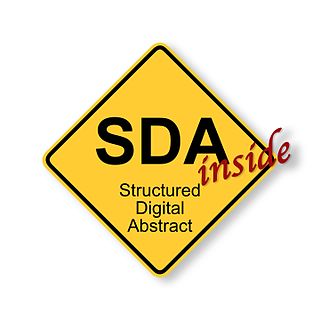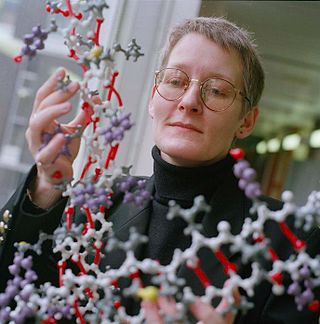
A citation is a reference to a source. More precisely, a citation is an abbreviated alphanumeric expression embedded in the body of an intellectual work that denotes an entry in the bibliographic references section of the work for the purpose of acknowledging the relevance of the works of others to the topic of discussion at the spot where the citation appears.
Scientometrics is a subfield of informetrics that studies quantitative aspects of scholarly literature. Major research issues include the measurement of the impact of research papers and academic journals, the understanding of scientific citations, and the use of such measurements in policy and management contexts. In practice there is a significant overlap between scientometrics and other scientific fields such as information systems, information science, science of science policy, sociology of science, and metascience. Critics have argued that overreliance on scientometrics has created a system of perverse incentives, producing a publish or perish environment that leads to low-quality research.
Unstructured data is information that either does not have a pre-defined data model or is not organized in a pre-defined manner. Unstructured information is typically text-heavy, but may contain data such as dates, numbers, and facts as well. This results in irregularities and ambiguities that make it difficult to understand using traditional programs as compared to data stored in fielded form in databases or annotated in documents.
Biomedical text mining refers to the methods and study of how text mining may be applied to texts and literature of the biomedical domain. As a field of research, biomedical text mining incorporates ideas from natural language processing, bioinformatics, medical informatics and computational linguistics. The strategies in this field have been applied to the biomedical literature available through services such as PubMed.

The Biochemical Journal is a peer-reviewed scientific journal which covers all aspects of biochemistry, as well as cell and molecular biology. It is published by Portland Press and was established in 1906.
InterPro is a database of protein families, protein domains and functional sites in which identifiable features found in known proteins can be applied to new protein sequences in order to functionally characterise them.
Semantic publishing on the Web, or semantic web publishing, refers to publishing information on the web as documents accompanied by semantic markup. Semantic publication provides a way for computers to understand the structure and even the meaning of the published information, making information search and data integration more efficient.

Carole Anne Goble, is a British academic who is Professor of Computer Science at the University of Manchester. She is principal investigator (PI) of the myGrid, BioCatalogue and myExperiment projects and co-leads the Information Management Group (IMG) with Norman Paton.

Robert David Stevens is a professor of bio-health informatics. and former Head of Department of Computer Science at The University of Manchester

UTOPIA is a suite of free tools for visualising and analysing bioinformatics data. Based on an ontology-driven data model, it contains applications for viewing and aligning protein sequences, rendering complex molecular structures in 3D, and for finding and using resources such as web services and data objects. There are two major components, the protein analysis suite and UTOPIA documents.
The National Centre for Text Mining (NaCTeM) is a publicly funded text mining (TM) centre. It was established to provide support, advice and information on TM technologies and to disseminate information from the larger TM community, while also providing services and tools in response to the requirements of the United Kingdom academic community.
The BioCatalogue is a curated catalogue of Life Science Web Services. The BioCatalogue was launched in June 2009 at the Intelligent Systems for Molecular Biology Conference. The project is a collaboration between the myGrid project at the University of Manchester led by Carole Goble and the European Bioinformatics Institute led by Rodrigo Lopez. It is funded by the Biotechnology and Biological Sciences Research Council.

A Structured Digital Abstract (SDA) is a method of describing relationships between biological entities in a structured, but human-readable, format. It is added below the abstract of scientific articles published in FEBS Letters and FEBS Journal. Current SDAs describe protein-protein interactions.
The NucleaRDB is a database of nuclear receptors. It contains data about the sequences, ligand binding constants and mutations of those proteins.

In scholarly and scientific publishing, altmetrics are non-traditional bibliometrics proposed as an alternative or complement to more traditional citation impact metrics, such as impact factor and h-index. The term altmetrics was proposed in 2010, as a generalization of article level metrics, and has its roots in the #altmetrics hashtag. Although altmetrics are often thought of as metrics about articles, they can be applied to people, journals, books, data sets, presentations, videos, source code repositories, web pages, etc.

Teresa K. Attwood is a professor of Bioinformatics in the Department of Computer Science and School of Biological Sciences at the University of Manchester and a visiting fellow at the European Bioinformatics Institute (EMBL-EBI). She held a Royal Society University Research Fellowship at University College London (UCL) from 1993 to 1999 and at the University of Manchester from 1999 to 2002.

Andrew M. Brass is a Professor of Bioinformatics at the University of Manchester in the Department of Computer Science and Faculty of Life Sciences.

Stephen Robert Pettifer is a Professor in the Department of Computer Science at the University of Manchester in England.
Enhanced publications or enhanced ebooks are a form of electronic publishing for the dissemination and sharing of research outcomes, whose first formal definition can be tracked back to 2009. As many forms of digital publications, they typically feature a unique identifier and descriptive metadata information. Unlike traditional digital publications, enhanced publications are often tailored to serve specific scientific domains and are generally constituted by a set of interconnected parts corresponding to research assets of several kinds and to textual descriptions of the research. The nature and format of such parts and of the relationships between them, depends on the application domain and may largely vary from case to case.
Biocuration is the field of life sciences dedicated to organizing biomedical data, information and knowledge into structured formats, such as spreadsheets, tables and knowledge graphs. The biocuration of biomedical knowledge is made possible by the cooperative work of biocurators, software developers and bioinformaticians and is at the base of the work of biological databases.









